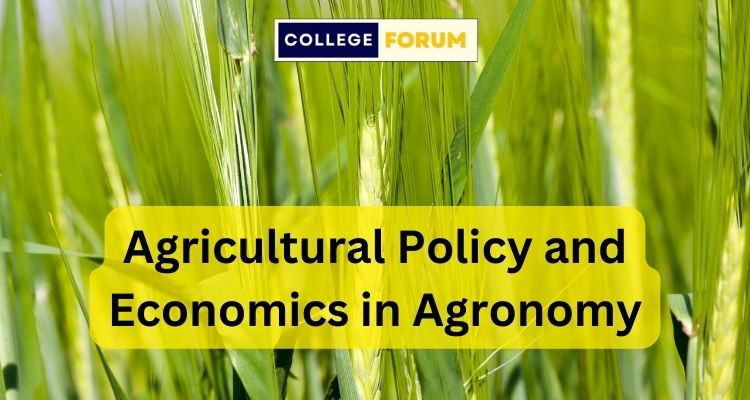Introduction of Agriculture Policy:
Agriculture policy and economics play a pivotal role in shaping the landscape of modern agronomy. As the world grapples with challenges such as food security, climate change, and rural development, the formulation and implementation of effective agricultural policies and an understanding of economic principles are essential for achieving sustainable farming practices. This article delves into the significance of agriculture policy and economics in agronomy, examining their influence on agricultural practices, resource allocation, and rural livelihoods. Additionally, we explore the offerings of the best MSc Agronomy colleges in Dehradun, known for their focus on agricultural policy and economics in their curriculum.
Understanding Agriculture Policy:
The agriculture policy encompasses a wide range of government interventions and regulations aimed at supporting and regulating agricultural production, trade, and rural development. These policies often address issues such as farm subsidies, price stabilization mechanisms, land tenure, environmental conservation, and food safety standards. The formulation of agricultural policies involves balancing the interests of various stakeholders, including farmers, consumers, policymakers, and environmental advocates, to achieve overarching goals such as food security, economic development, and environmental sustainability. Agricultural policy and economics play a pivotal role in shaping the landscape of modern agronomy. As the global population burgeons and the demand for food surges, the intersection of agronomy, policy, and economics becomes increasingly critical in ensuring sustainable agricultural practices. In this comprehensive article, we delve into the intricate relationship between agriculture policy, economics, and agronomy, exploring the challenges, opportunities, and the role of education in shaping the future. Additionally, we highlight the significance of choosing the best MSc Agronomy colleges in Dehradun, which stand out for their focus on these vital aspects of agriculture.
Impact of Agriculture Policy on Agronomy:
Agricultural policies have a profound impact on agronomy by influencing farmers’ decision-making processes, resource allocation, and agricultural practices. For example, subsidies provided to farmers for adopting sustainable farming practices such as organic agriculture or conservation tillage can incentivize the adoption of environmentally friendly practices. Similarly, price support mechanisms can affect farmers’ cropping choices and production decisions, influencing the diversity and sustainability of agricultural systems.
Economic Principles in Agronomy:
Economic principles play a crucial role in understanding the behavior of agricultural markets, resource allocation, and farm management decisions. Concepts such as supply and demand, market equilibrium, production efficiency, and cost-benefit analysis are fundamental to analyzing agricultural production systems and designing effective agricultural policies. Economists and agronomists collaborate to assess the economic viability of different agricultural practices, evaluate the impacts of policy interventions, and identify strategies for improving farm profitability and sustainability.
Challenges and Opportunities in Agriculture Policy and Economics:
The field of agriculture policy and economics faces numerous challenges, including the need to balance competing interests, address market distortions, and promote equitable access to resources. Additionally, the dynamic nature of agricultural markets, technological advancements, and global trade dynamics pose challenges in formulating responsive and adaptive agricultural policies. However, there are also opportunities for innovation and collaboration, such as leveraging technology and data analytics to inform policy decisions, promoting agroecological approaches to farming, and fostering partnerships between governments, academia, and industry stakeholders to address common challenges. Economics is a fundamental aspect of agronomy, influencing decisions related to resource allocation, technology adoption, and market participation. Farmers, agribusinesses, and policymakers must navigate the complex economic landscape to strike a balance between profitability and sustainability. Economic factors, such as market prices, input costs, and government subsidies, directly impact agronomic practices. The adoption of new technologies, precision farming techniques, and sustainable practices often hinges on economic feasibility and incentives. Agricultural policies are the driving force behind the decisions that govern farming practices, trade, subsidies, and environmental regulations. Governments formulate policies to address issues such as food security, environmental sustainability, and rural development. In agronomy, these policies shape the choices farmers make, influencing crop selection, land use, and resource management. Effective policies can encourage sustainable practices, mitigate environmental impact, and ensure fair market conditions for farmers.
Best MSc Agronomy Colleges in Dehradun:
In Dehradun, several MSc Agronomy colleges stand out for their comprehensive curriculum that includes a focus on agriculture policy and economics. Agriculture policy and economics are integral components of agronomy, influencing agricultural practices, resource allocation, and rural livelihoods. By understanding the principles of agricultural policy and economics, agronomists can contribute to the formulation and implementation of effective policies that promote sustainable farming practices, enhance food security, and support rural development.

